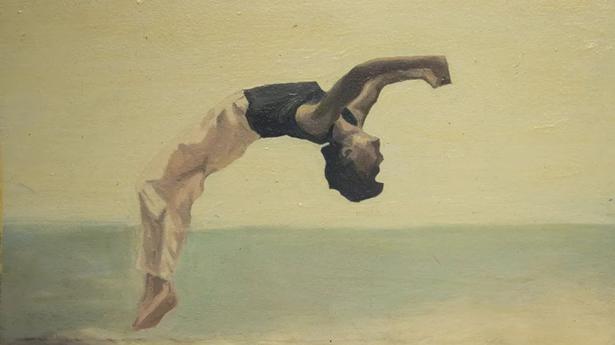
Amshu Chukki shines a spotlight on the unseen with his solo show
The Hindu
Artist Amshu Chukki documents what is left unacknowledged in a movie shoot with his ongoing exhibition
There is magic in the movies and a certain sense of fascination as to what goes on behind the scenes. With his exhibition titled ‘Different Danny and Other Stories,’ Bengaluru-based artist Amshu Chukki explores what goes unnoticed in the making of those scenes.
“Whenever we talk about cinema, we discuss narrative, theme and the film itself. With this exhibition, I try to showcase the cinematic excess that is left behind. ‘Different Danny and Other Stories,’ can be viewed in two parts — how a stuntman deciphers the landscape of a city, keeping in mind potential choreography and how residents and production managers negotiate a house as a set,” says Amshu.
He adds that he has been following the career of Different Danny, a stunt director in Kannada cinema for over a decade now, observing how he looks at choreography, stunts and the city as a set. “The mechanism of cinema both shows and hides the role of a stuntman. He plays the duplicate or body double; even though he is present on the screen, he remains unseen.”
“A lot of my work is research-based and follows a certain thread of enquiry. My initial idea was to look at where cinematic moments meet in a city’s milieu and I found that in the way a stunt director thinks about the city.”
Amshu looks at the process of a recce prior to a shoot as an exploration of urban space and landscape through cinema. He talks about his documentation of houses in Bengaluru that double up as film sets and how its residents negotiate between the cinematic and domestic.
“Unlike most of us, these people wake up in the morning in their homes and after a while a crew comes over and changes the orientation of the house. In the evening they pack up and the family returns to their own life. And while they live a modular life, they are not just bystanders either; they are aware of the cinematic process. They sometimes double as extras or instruct the crew on the vantage points of the house.”
A film shoot changes a neighbourhood by its activity and that is one way of looking at the city or landscape — through a cinematic register.

“Writing, in general, is a very solitary process,” says Yauvanika Chopra, Associate Director at The New India Foundation (NIF), which, earlier this year, announced the 12th edition of its NIF Book Fellowships for research and scholarship about Indian history after Independence. While authors, in general, are built for it, it can still get very lonely, says Chopra, pointing out that the fellowship’s community support is as valuable as the monetary benefits it offers. “There is a solid community of NIF fellows, trustees, language experts, jury members, all of whom are incredibly competent,” she says. “They really help make authors feel supported from manuscript to publication, so you never feel like you’re struggling through isolation.”

Several principals of government and private schools in Delhi on Tuesday said the Directorate of Education (DoE) circular from a day earlier, directing schools to conduct classes in ‘hybrid’ mode, had caused confusion regarding day-to-day operations as they did not know how many students would return to school from Wednesday and how would teachers instruct in two modes — online and in person — at once. The DoE circular on Monday had also stated that the option to “exercise online mode of education, wherever available, shall vest with the students and their guardians”. Several schoolteachers also expressed confusion regarding the DoE order. A government schoolteacher said he was unsure of how to cope with the resumption of physical classes, given that the order directing government offices to ensure that 50% of the employees work from home is still in place. On Monday, the Commission for Air Quality Management in the National Capital Region and Adjoining Areas (CAQM) had, on the orders of the Supreme Court, directed schools in Delhi-NCR to shift classes to the hybrid mode, following which the DoE had issued the circular. The court had urged the Centre’s pollution watchdog to consider restarting physical classes due to many students missing out on the mid-day meals and lacking the necessary means to attend classes online. The CAQM had, on November 20, asked schools in Delhi-NCR to shift to the online mode of teaching.









